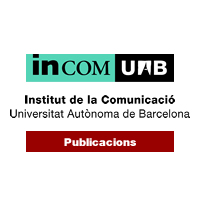
"Hispano-Lusophone" community media: identity, cultural politics and difference
Ana Stela de Almeida Cunha, Miguel de Barros, Rosana Martins (Eds.) (2018): “HispanoLusophone” Community Media: Identity, Cultural Politics and Difference. InCom-UAB
Publicacions, 17. Bellaterra: Institut de la Comunicació, Universitat Autònoma de Barcelona.
ISBN 978-84-948252-1-7
- Descarregar el llibre en format PDF (DDD)
SINOPSI:
In recent years, the issue of identity has been the subject of an intensive analysis across different fields and disciplines. Indeed, in an era of accelerated social and technological changes under the phenomenon of globalization, with the rapid internationalization and expansion of urban centres across the world, this is of little surprise. According to Lyotard (2006), these sweeping changes have set a crucial moment in a much longer process of displacement, through which dominant narratives, traditions and structures have progressively lost their historic power. As a part of this social reconfiguration, institutions have dematerialized, while beliefs, traditions and cultural practices have gained flexibility through rapid and frequent changes. In such a context, we witness the advent of a new subject, whose identity is no longer fixed, as well as the development of new forms of inequality, as it all converges to modify the contemporary social and political landscape. In these terms, Arjun Appadurai (1996) uses the expression "global cultural economy" to describe the myriad of cultural meeting points and flows underpinning this new modern, globalized world. As the author explains, "the new global cultural economy has to be seen as a complex, overlapping, disjunctive order that cannot any longer be understood in terms of existing centre-periphery models" (Appadurai, 1996:32). Indeed, the ongoing renegotiation and traversal of traditional borders point towards a multiplicity of new, non-monolithic membership forms: collectivities in which the local and the global, as experiential entities, are intimately intertwined (Featherstone & Lash, 2002). With this in mind, we have operationalized the concept of 'multi-territoriality' as a guide for this book. Such an expression, initially proposed by Haesbaert (1994) but further developed by Augé (1995), Albagli and Maciel (2010), refers to the intensification of multiple territorial re-imaginings and repossessions. In this context, displacement does not mean the abandonment of already established territorial references, but rather the addition of new references, which come together to form a complex matrix of feelings of belonging and ownership, towards a multiplicity of places and spaces. The intense flow of people and information appears pivotal to this panorama. Hence, the proliferation of 'differences' establishes a strategic space for intervention, which goes beyond and onto a broader, non-universalizing understanding of culture. In this process, the differences and experiences are taken into consideration, creating the basic conditions for societies to be transformed and improved. One of the most notable consequences of these shifts is the current social reconfiguration, with the consequent surfacing of groups that were previously marginalized. Indeed, these groups find themselves now able to capitalize on new flows of information, communication and expertise. Consequently, novel social categories and relations of belonging are forged, extending both within and across national boundaries (Santos & Rodríguez, 2003). Inspired by the idea of 'territory' as a cultural construct, created, contested and transformed in various ways by media technologies (Canclini, 2001; Appadurai, 2001; Haesbaert, 1994), the works collected in this edition span and explore several of the community media projects, parts of a 'space'1 named the 'Hispano-Lusophone' sphere. By mapping and exploring the creative and intellectual production in the context of the Hispano-Lusophone imaginary, this project consciously endeavours to disarm and overturn certain cultural and raced hierarchies within the global knowledge production. Its authors come from a large array of professional backgrounds: they have worked intensively to overcome the significant linguistic and geographical barriers to intellectual collaboration. In this respect, the authors draw into critical examination the established frontiers of knowledge production, as well as the main agents and processes that create and legitimate those borders.
